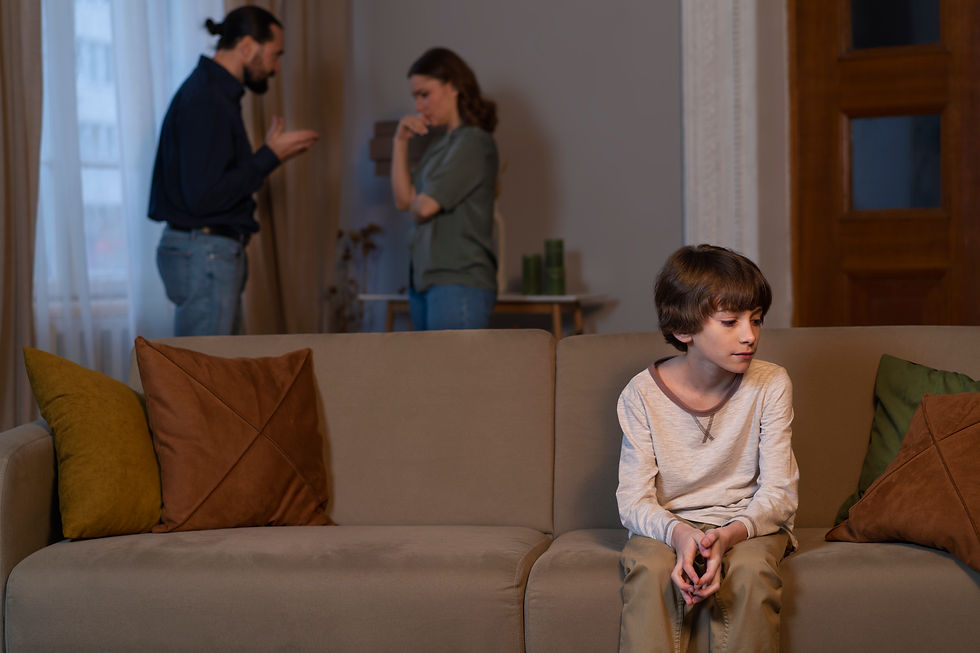“Other People Have It Worse”: Why Your Pain Still Deserves a Voice
- Lana Alencar

- Jul 1, 2025
- 4 min read
What keeps coming up in the therapy room – Part 1
There’s a sentence I hear almost every week in my counselling office. Sometimes whispered. Sometimes said with guilt or even a nervous laugh:
“I don’t know why I’m so upset. Other people have it worse.”
I get it. It feels noble to push our pain aside because someone else might be going through something “bigger.” We’ve heard this all our lives — maybe from our parents, from teachers, from the pulpit, or even from well-meaning friends. We were raised to be strong, to keep going, to not complain. And over time, we’ve learned to measure our suffering against someone else’s story.
But here’s what I tell my clients, and maybe what you need to hear today too:
Your pain is still valid. Even if someone else has it worse.

In fact, comparing our struggles to others often keeps us stuck — disconnected from our emotions, ashamed of our needs, and unwilling to reach out until things are “bad enough.” By the time someone finally walks through my door, what could have been a small adjustment has often turned into years of hurt, resentment, burnout, and quiet grief.
💬 A Pattern That Starts Early
I often wonder where this begins — this internal rule that says, “Unless it’s the worst pain imaginable, I don’t deserve care.” And I think a lot of it starts in childhood.
Children are constantly testing the world to see if their emotions are safe to feel and express. But many of us were told things like:
“That’s nothing to cry about.”
“You’re being dramatic.”
“People are starving in other parts of the world — be grateful!”
These statements may have been meant to offer perspective, but what they often taught us was: Your feelings are too much. Others matter more. Shrink yourself.
And so, as adults, we second-guess our own emotions. We apologize for feeling tired, overwhelmed, or heartbroken — because we imagine someone else has earned the right to those feelings more than we have.
But that’s not how emotional health works.
Research shows that invalidating a child’s emotions — even unintentionally — can lead to long-term challenges in emotional regulation, anxiety, and depression.(See: Yap et al., 2010; Buckholdt et al., 2009 — studies on emotional invalidation and youth mental health)
We cannot rank pain and expect healing.
🧠 Your Nervous System Doesn’t Compare
From a biological perspective, your brain and body respond to your own lived experience — not someone else’s. Stress hormones are released, muscles tighten, your thoughts spiral — not because your situation is “the worst,” but because it’s yours, and it matters to you.
Pain is not a competition. We’re not meant to “win” at suffering. We’re meant to process and grow through it.
🙏 For the Christian Heart: Yes, You’re Still a Good Christian
If you grew up in the church or hold Christian values, you may carry even more pressure to stay strong, grateful, and self-sacrificing. Maybe you've been told that joy is the only acceptable emotional state for a believer. But here’s the truth:
Jesus wept.
David lamented.
Job cried out.
Paul despaired of life itself. (2 Corinthians 1:8)
Scripture is full of faithful people who felt deep pain — and still remained deeply loved by God.
Suffering doesn’t disqualify your faith. In fact, facing your pain with honesty is an act of spiritual maturity. Naming your grief or anxiety doesn't make you weak — it means you're human. And healing starts with truth.
🔁 Let’s Stop the Cycle

When we believe our emotions don’t matter, we unintentionally teach the next generation the same. Children grow up feeling unseen and emotionally disconnected. Teenagers internalize shame. Adults live with burnout and resentment.
But what if we did it differently?
What if we said:
“I see you’re upset. That matters.”
“You don’t have to compare your pain to anyone else’s.”
“It’s okay to need help — even if your life looks fine from the outside.”
Counselling isn’t just for crisis. It’s for the everyday wounds that pile up slowly. It’s for the perfectionist, the people-pleaser, the parent, the pastor’s wife, the overwhelmed student — the person trying to do it all without breaking down.
Maybe that’s you. Maybe it’s time to stop ranking your pain and start tending to it.
You deserve to heal.
📍 Counselling available in Winkler, MB and across the Pembina Valley
🖥️ Learn more or book a session: lanaalencar.com
Lana Marinho Bezerra Alencar, M.A. Counselling
Associate Professional Counsellor, PACCP #769MB22
Specializing in women’s struggles, relationship dynamics, identity and personal growth.
📚 Sources:
Yap, M.B.H., Allen, N.B., & Sheeber, L. (2010). Maternal emotion regulation strategies and child emotion regulation skills. Journal of Youth and Adolescence.
Buckholdt, K.E., Parra, G.R., & Jobe-Shields, L. (2009). Emotion regulation mediates the relationship between trauma and internalizing symptoms in adolescents. Journal of Child and Adolescent Trauma.
Linehan, M. (1993). Cognitive-Behavioral Treatment of Borderline Personality Disorder. (Concept of emotional invalidation)
.png)



Comments